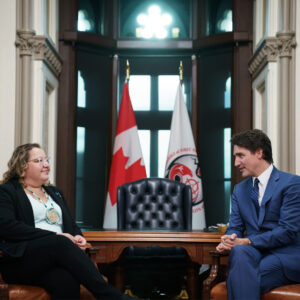
OTTAWA – The Legal and Constitutional Affairs Committee of the Senate of Canada gathered on September 18th, 24th and 25th to discuss Bill C-10, which deals with the issue of “contraband” tobacco affecting reserves across Canada. As has been reported in this paper, Bill C-10 has been widely condemned by many Indigenous leaders and by the manufactures of Native tobacco products.
The Senate Committee heard from a wide range of witnesses who spoke in favour of the Bill, including representatives from Public Safety Canada, the RCMP, Canada Border Services and the OPP. The Committee also heard from a number of Onkwehon:we people who spoke against the Bill.
The witnesses who spoke in favour of the Bill deliberately attempted to tie Native tobacco production to organized crime and insecurity. Superintendent Jean Cormier from the RCMP went so far as to say that, “Tobacco contraband is a serious threat to public security.” In their questioning, various Senators also tried to make a connection between Native tobacco and organized crime, though they did not make it clear how Bill C-10 would address security issues without criminalizing many of those who are legitimately engaged in the tobacco production business.
Of particular note was the testimony of Paul Saint-Denis, Senior Counsel – Criminal Law Policy Section for Justice Canada. When asked if the government had consulted Indigenous leaders about this bill, Paul Saint-Denis admitted, “No, we did not.” He then claimed that the presentations in the committees of Parliament by Indigenous people were a form of consultation and implied this would be sufficient. Paradoxically, when asked if Justice Canada had considered if the Bill would pass the constitutionality test, MR. Saint-Denis answered in the affirmative.
Six Nations Elected Chief, Ava Hill called on the Parliament of Canada to withdraw the Bill due to the lack of consultation, stating, “We see this issue as a jurisdiction and rights issue, as well as an economic one.” She pointed out the hypocrisy of a government that speaks about job creation yet puts forward bills that will kill jobs on reserves. She also dispelled the myths about the supposed connections to organized crime, emphasizing instead the legitimate jobs the Native tobacco industry created and the positive impacts this economic activity has within the community.
Hill countered that instead about being about safety, “Bill C-10 is really about Canada trying to protect its tax revenues at the expense of First Nations communities.” Ava Hill also insisted that this Bill is a violation of the Two Row Wampum, the right of self-determination of Indigenous people, Canada’s own constitution, and potentially a violation of the Canadian Human Rights Act for its targeting of Indigenous peoples.
Opposition to the Bill from Onkwehon:we people was unanimous. Gordon Peters, of the Association of Iroquois and Allied Indians, emphasized the sovereignty of the Haudenosaunee people and suggested the tobacco industry could and should be self-regulated. Kirby Whiteduck of the Algonquin Nation, also called for the bill to be withdrawn. Reading from a prepared statement, Jody Kechego of the Anishnabek Nation, declared, “The government of Canada has no legal right to regulate tobacco within First Nations’ treaty and traditional territories.” He also reiterated that the right to cultivate tobacco is an inherent right that comes not from treaties but rather from the Creator. Hill and Kechego rejected the notion that Native tobacco should be considered “contraband” at all.
The members of the Senate gave little indication they would withdraw the Bill as all Onkwehon:we witnesses demanded. With a majority in the Senate, the Harper Conservatives seem poised to pass the Bill.







